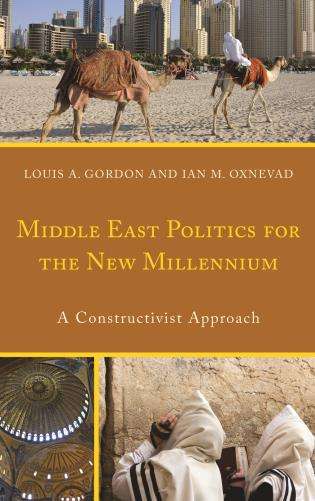Religious and ethnic tensions are critical to analyzing Middle East politics

Conventional analyses of Middle Eastern geopolitics overlook the complex relationships and cultures of ethnic and religious groups in the region, sometimes with disastrous results, according to political scientists from the University of California, Riverside and Cal State San Bernardino.
In a new book, "Middle East Politics for the New Millennium: A Constructivist Approach" (Rowman & Littlefield, 2016), Louis A. Gordon and Ian Oxnevad advocate a new approach to analyzing the region, one that focuses less on theoretically interchangeable states in favor of one that draws on geography, ethnicity, religion, language, and the internal dynamics of countries in the region to interpret political events.
"The Middle East is not a monolithic area," wrote Oxnevad, a Ph.D. candidate in political science at UC Riverside, and Gordon, who teaches in the political science department at CSUSB. "While the vast majority of Middle Easterners are both Muslim and Arab, the observer who fails to properly analyze the cultures of the smaller ethnic and religious groups will miss many political issues that captivate both the ruling factions and their opponents in the region."
The book uses the international relations theory of constructivism – a model not typically applied to issues of geopolitical security in political science – to explain the politics and relations of countries in the Middle East and North Africa. Topics covered range from pan-Arabism (the idea that all the Arab-speaking peoples constitute one larger nation) to the Arab Spring, de-colonization to the rise of ISIS, the Iraq War, and the Middle East conflict.
Foreign policy experts typically focus on the state in recommending courses of action in the Middle East, which adds to the crisis-driven nature of much of the current political analysis of the region, Oxnevad and Gordon said. Externally, every country in the Middle East seems like an ordinary state, even though internal dynamics and outlooks are so different from one country to the next "as to stretch the concept of the state," they added.
Constructivism, focusing on the development of ideas and identities over time, provides a better starting point for addressing Middle East politics, they believe. "It is in this constructivist framework that migrations, religious conversions, imperial development and collapse, revolution, and modern manifestations of ancient identities can be taken into account," the researchers wrote.
Critical to understanding the Middle East is the role of religion. Western policymakers have often portrayed Middle East politics in black-and-white terms when addressing religion, even though the region is home to a great diversity of sects and denominations, with populations ranging from "the fiercely secular to the violently religious," Oxnevad and Gordon wrote.
One has to look no further than the Sunni insurgency after the 2003 U.S. invasion of Iraq for an example of what ignorance or misunderstanding of religious factions can produce. If American and British policymakers had understood historic Sunni-Shi'a tensions and the role of tribes, Gordon and Oxnevad wrote, "they would have had an easier time of controlling the country after the fall of Saddam Hussein. Indeed, their failure to utilize the available cultural knowledge was costly for the United States."
Constructivism is the best theory to explain how disenfranchised Ba'athists, who ruled Iraq under Saddam Hussein, helped in the rise of ISIS, they added. "While the United States sought to eliminate the Ba'athists from positions of influence, the policy of disenfranchising party members led to their support for opposition groups, including ISIS. This might have been avoided had the U.S. considered the actual role of the Ba'athists in Iraqi society and the nature of pan-Arabism."
Addressing the Israel-Palestine conflict, the authors said that constructivism allows for the consideration of powerful cultural issues, such as the importance of honor and dignity in Palestinian society; Benjamin Netanyahu's personal understanding of the international community's failure to protect Jews during the Holocaust; and the cultural landscape within Israel.
Viewing Middle East politics as a succession of crises among theoretically interchangeable states overlooks the importance of the region's geopolitical conditions, leadership psychology, and the power of religious ideas, Oxnevad and Gordon wrote.
"Without an understanding of the unique culture in each country and region, a complete understanding of the various political conflicts is simply not obtainable," they said. "… With state breakdown, insurgency, and nuclear proliferation serving as the main trends in Middle East politics in the 21st century, a continued misunderstanding of the region can carry disastrous implications."
Provided by University of California - Riverside



















